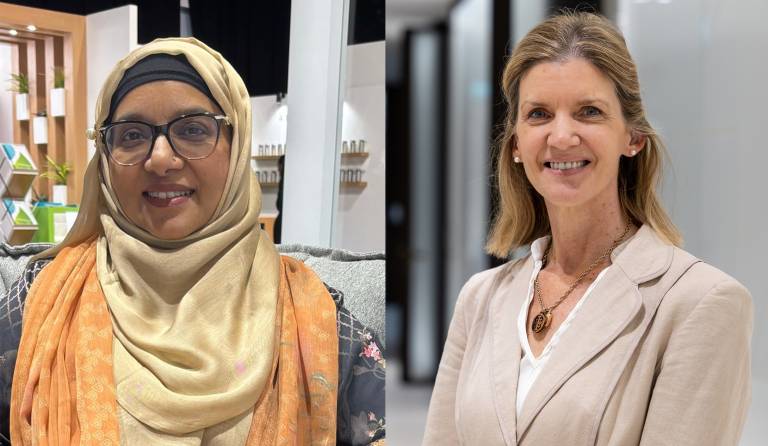UCL Computer Science announces new Honorary Professors in Practice
18 January 2024
We are delighted to recognise Professors Husna Ahmad and Julia Manning for their support of the department’s UCL IXN programme, contributing through their respective links with the UN and the NHS.

The UCL Industry Exchange (UCL IXN) programme gives students work experiences in industry, charities and the NHS. Working with these partners, computer science students devise proofs of concept that use technology to solve real-world problems.
Both Husna and Julia are impressive mentors and role models for our students. Learn about them and their involvement with the department.
Tell us about yourself
Husna: I have over 30 years’ experience in civil society. Over this time, I have supported the launch of several non-governmental organisations (NGOs) and civil society organisations (CSOs).
I attained my PhD in International Environmental Law from SOAS in 2000. I was always keen to align my academic background with my NGO work, and I managed to do so ten years ago with the international NGO Global One, a woman’s INGO in consultative status with the UN.
I am an advisor to various UN bodies and the World Bank. Over the last four years, it's been exciting to share my knowledge with UCL students. I’m involved with hackathons, induction week events and numerous UCL IXN projects alongside the team led by Prof Dean Mohamedally, Prof Graham Roberts and Dr Yun Fu.
I’m also looking forward to engaging with students on UCL’s new Master’s course in Artificial Intelligence for Sustainable Development.
Julia: I’m committed to harnessing technology to improve patient outcomes, either by making life easier for clinicians or enhancing patient experiences and control.
I trained as an optometrist and specialised in diabetes and visual impairment. Vision testing software transformed the quality of care that my practice could provide, delivering more insight and improving patients’ understanding and care.
I took that learning into health policy research and explored emerging solutions from electronic patient records to apps to remote monitoring. My PhD in Human-Computer Interaction at UCL explored vital contextual influences on digital health design and implementation.
I am currently President of the Royal Society of Medicine’s Digital Health Council and oversee postgraduate education in a cross-disciplinary forum that has covered AI to Digital Therapeutics to the metaverse.
Explain your role with UCL Computer Science
Husna: I am honoured to be awarded this Honorary Professorship in Practice. It sets me further on my path, which I embarked on at the start of my career, to demonstrate the leadership of women in building a more inclusive and diverse, peaceful and sustainable society.
I am thrilled to be joining the Athena Swan programme to support women in engineering, especially in AI, for sustainable development, climate change, and NGO support.
I hope my efforts will give undergraduates and Master's students a better understanding of the critical role of civil society as changemakers for good.
Julia: I’m delighted to receive this Honorary Professorship in Practice.
I am Digital Health Lead for IXN for the NHS. My role includes enabling collaboration between clinicians, industry and computer science students in early stage health software R&D.
It's exciting to help the NHS and healthcare providers innovate through collaboration as this interdisciplinary way of working delivers real-world proofs-of-concept. I’m constantly impressed by the outstanding quality of the working prototypes they build together.
So, I urge clinicians in the NHS, independent providers or social care to get in touch. Come to us with your ideas for using technology to improve efficiency or interoperability. We can help you test out innovative solutions or new digital companions that will enhance patient care or self-care.
Tell us about the students
Husna: The creativity, passion and energy I find in the UCL students is just wonderful. They’ve enabled our NGOs to find ways of capturing data so we can share it between the Global South countries, which has been fantastic. The students think outside the box, coming up with original ideas, some so simple that you think, ‘Why has no one thought of that before?’
Julia: IXN for the NHS is a brilliant introduction for the students to the many benefits technology can bring to healthcare. It’s heartening to see how fired up they become about possible solutions. I hope that many more will go on to roles in the NHS, inspired by the experience they have gained.
It’s also hugely rewarding to work with our industry partners, Microsoft, IBM and Intel, to name a few. They are excellent mentors for our students, and we are united in our mission to use resources more efficiently and improve patient experience and outcomes.
 Close
Close

